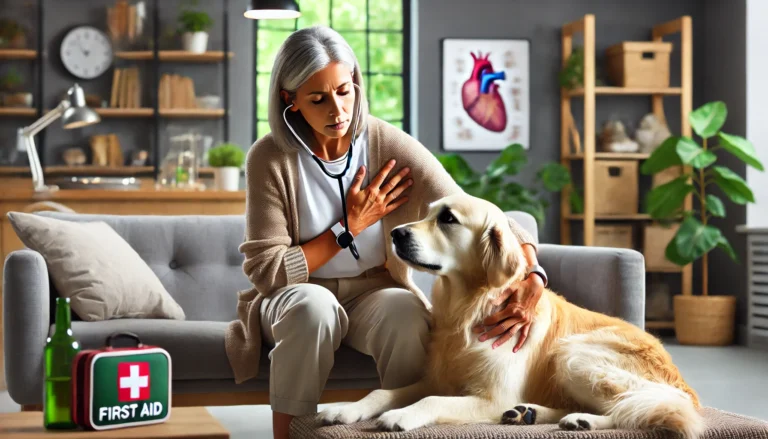do dogs know when they are dying?

The question “Do dogs know when they are dying?” is one that many pet owners ask when faced with the reality of their dog’s illness or old age. It’s a question that stirs deep emotion and concern. As our dogs age or become ill, it’s natural to wonder whether they can sense their mortality and if they understand the physical changes happening to them as they approach the end of their life. This article delves into this question, exploring various aspects of canine behavior, biology, and psychology. From the signs dogs display when nearing death to the latest research on animal cognition, we will answer this question and provide helpful advice for pet owners.
Do Dogs Know When They Are Dying? Understanding Canine Cognition
To answer the question “Do dogs know when they are dying?”, it’s essential to first explore how dogs perceive their bodies and their environment. While dogs may not have the same intellectual understanding of mortality as humans do, they certainly have a keen awareness of physical changes in their bodies.
Can Dogs Understand Their Own Bodies?
Dogs have a unique cognitive and sensory makeup. While they may not grasp abstract concepts like death, they are acutely aware of their bodies. Dogs can detect physical discomfort, pain, fatigue, and changes in their health. For instance, a dog may begin to behave differently when they are in pain or experiencing symptoms of illness. But, do dogs know when they are dying? It’s likely that they understand something is wrong in a more instinctual way, though they may not grasp the full concept of death as humans do.

Sensing Changes: Do Dogs Know When They Are Dying?
Dogs are highly perceptive creatures. If a dog is feeling unwell or experiencing a decline in health, it will often seek solitude or show signs of distress. These physical and behavioral changes suggest that dogs are aware of shifts in their bodies and may be aware that something is wrong. However, whether dogs understand these changes as “dying” is another question.
Do Dogs Know When They Are Dying? Key Behavioral Signs to Look For
If you’re wondering “do dogs know when they are dying?”, one of the most important things to consider is the changes in behavior and physical signs that a dog exhibits as it nears the end of life. These signs might not necessarily indicate that a dog comprehends the concept of death, but they do reflect significant changes that suggest a dog is aware that it is no longer feeling well.
Behavioral Changes That Suggest a Dog Knows It Is Dying
As a dog nears death, you may observe subtle or significant changes in its behavior. These signs often indicate that the dog is aware of its declining health. Some of these changes include:
- Increased lethargy and withdrawal: A dog nearing the end of life may sleep excessively and avoid activities it once enjoyed, such as walking or playing.
- Loss of appetite: A dying dog may stop eating or drinking, a clear sign that something is wrong with its body. While this is not necessarily a sign that a dog knows it is dying, it suggests the dog is aware that its body is not functioning as it should.
- Seeking solitude: Many dogs, when they are nearing death, will retreat to quiet, isolated areas. This may be their instinctual response to feel safer or more at peace as they experience discomfort or weakness.
- Changes in behavior towards humans: Some dogs may become more clingy, seeking attention from their owners, while others may withdraw entirely and refuse affection.
Physical Signs: Do Dogs Know When They Are Dying?
Along with behavioral changes, physical signs often accompany the end of life. While these symptoms don’t necessarily mean that a dog comprehends that it is dying, they reflect serious changes in the dog’s body:
- Difficulty breathing: Labored breathing, coughing, or panting may indicate that the dog’s body is struggling with cardiovascular or respiratory failure.
- Loss of coordination: Dogs nearing death may become unsteady on their feet or have trouble walking due to muscle weakness, pain, or neurological decline.
- Incontinence: Many dogs lose control of their bladder or bowels as their bodies shut down, which can be both physically and emotionally difficult for both the dog and the owner.
- Cold extremities: As the body begins to shut down, the dog’s extremities may become cold, reflecting a decrease in blood circulation.
Tips
Fish oil for dogs boosts joint health, reduces inflammation, and promotes a shiny coat, making it a powerful supplement for overall wellness. Rich in omega-3 fatty acids, it supports heart health, skin condition, and cognitive function in dogs of all ages.
Do Dogs Know When They Are Dying? Understanding Grief and Emotional Awareness
Another layer to the question “do dogs know when they are dying” involves their emotional awareness and how they react to the death of others, both human and animal companions. While dogs may not understand death in the same way we do, there is significant evidence to suggest that they are sensitive to emotional shifts and the absence of loved ones.
Do Dogs Grieve the Death of a Companion?
If you’re wondering whether dogs can understand when a companion is dying or has passed, it’s important to note that dogs have been observed to show signs of grief after the loss of a companion, either human or animal. While they may not fully comprehend the permanence of death, they react to changes in their environment and the absence of a familiar presence. Some signs of grief in dogs include:
- Withdrawal or sadness: A grieving dog may become more subdued, withdrawn, or disinterested in activities it once enjoyed.
- Increased anxiety: Some dogs may show signs of anxiety or stress when left alone or when their routine is disrupted due to the absence of a companion.
- Searching behaviors: Dogs may search for the deceased companion, displaying behaviors that suggest they recognize the absence and are trying to understand what happened.
- Changes in vocalization: Dogs may whine, howl, or cry in response to the loss of a companion.
These behaviors strongly suggest that dogs are aware of the emotional and environmental changes brought about by death, though they may not understand death in the human sense.
The Science Behind Canine Sensory Abilities: Can Dogs Smell Death?
A critical factor in determining whether dogs know when they are dying is their extraordinary sensory ability, particularly their sense of smell. Dogs are equipped with an olfactory system that is far more sensitive than ours, allowing them to detect minute chemical changes in the environment.
Do Dogs Know When They Are Dying by Sensing Chemical Changes?
One of the most commonly discussed theories regarding whether dogs know when they are dying is their ability to detect chemical changes in the body. Dogs have an olfactory sense that is anywhere from 10,000 to 100,000 times more sensitive than that of humans. Because of this heightened sense of smell, dogs may be able to detect the subtle chemical markers that signal illness, and perhaps even the physiological decline that precedes death.
Research has shown that dogs can be trained to detect diseases like cancer or diabetes by smelling changes in body chemistry. This ability suggests that dogs may be capable of detecting when a body is in a state of decline. Therefore, it’s plausible that dogs can sense when a human or another animal is approaching the end of their life, even if they don’t fully comprehend what is happening.
How to Care for a Dying Dog: Providing Comfort as They Near the End
If you believe your dog may be nearing the end of its life, it’s essential to know how to provide the best care and support. Even if you’re unsure whether your dog knows it is dying, you can still ensure their final days are filled with comfort and dignity.
Creating a Comfortable Space for Your Dying Dog
One of the first steps in caring for a dog that may be dying is to create a peaceful and comfortable environment. Ensure your dog has a quiet, soft place to rest, free from noise and disturbances.
Pain Management: Helping Your Dog as They Approach the End
If your dog is in pain, it’s important to consult with your veterinarian for options to manage their discomfort. There are numerous medications and therapies available to ease pain and help your dog remain as comfortable as possible in their final days.
Hydration and Nutrition for a Dying Dog
Even if your dog is not eating or drinking much, it’s important to offer small amounts of water or food. In some cases, your vet may recommend methods to ensure your dog receives adequate nutrition, such as feeding tubes or liquid nutrition.
Emotional Support for Your Dying Dog
Provide your dog with comfort and companionship. Some dogs may seek your affection, while others may prefer to be left alone. Be there to support your dog emotionally, as your presence can provide a sense of security.
Recognizing When It’s Time to Say Goodbye
The decision to let go of your dog can be heart-wrenching. It’s crucial to recognize when your dog is suffering and to consult with your vet about humane euthanasia options to prevent prolonged pain.
Conclusion: Do Dogs Know When They Are Dying?
So, do dogs know when they are dying? While the answer isn’t straightforward, evidence suggests that dogs are certainly aware of their physical decline and emotional changes in their environment. Dogs can sense illness, pain, and discomfort, and they may instinctively know that their health is deteriorating. Although they may not understand death in the same way humans do, dogs exhibit behaviors that suggest they are aware of their body’s changing state and may sense the emotional shifts associated with death.
As a pet owner, understanding these signs and providing compassionate care during your dog’s final days can ensure that their end-of-life experience is as peaceful and dignified as possible.
1. Can dogs sense when they are dying?
Yes, dogs can often sense when they are dying due to their acute awareness of physical changes in their bodies. They may become more withdrawn, stop eating, or seek solitude. While they may not understand the concept of death, they can feel the decline in their health and may adjust their behavior accordingly.
2. Do dogs know when they are being put down?
Dogs don’t have an intellectual understanding of euthanasia, but they can sense changes in their environment. They may feel anxious or confused as they detect the emotional shifts in their owners and surroundings. Some owners report that their dogs seem to relax or even act more peacefully after euthanasia, suggesting that dogs may feel a sense of relief when the decision is made in a calm, loving manner.
3. Do dogs get scared when they know they’re dying?
It’s possible that dogs experience fear or anxiety as they approach death, especially if they are in pain or discomfort. However, many dogs also seek comfort and closeness to their owners. If a dog is frightened, it’s important to provide reassurance and a calm environment. Dying dogs often look for security in familiar surroundings and may prefer to be left alone or gently comforted.
4. Do dogs cry at the end of life?
While dogs don’t “cry” in the same way humans do, they can vocalize through whining, howling, or whimpering. These sounds may indicate distress, discomfort, or confusion as they approach the end of life. Some dogs may become more vocal when they sense something is wrong or if they are in pain. However, not all dogs will exhibit these signs, as some become quieter and more withdrawn.
5. What happens immediately before a dog dies?
In the hours or days leading up to death, dogs may exhibit signs of lethargy, disorientation, and loss of coordination. Their breathing may become labored, and they may lose control over their bladder or bowels. Many dogs withdraw and seek solitude, while others may be clingy and need extra comfort. When death approaches, a dog’s body will gradually slow down, and they may stop eating, drinking, and responding to stimuli.
6. Did my dog know I loved him before he died?
Yes, dogs are highly attuned to human emotions and bonds. They can sense your love through your tone of voice, touch, and routine interactions. Dogs form deep emotional connections with their owners, and they understand affection, comfort, and security. It’s likely that your dog knew you loved them, as dogs are capable of recognizing the love and care they receive from their owners, especially in their final days.






